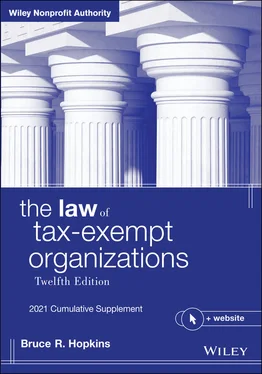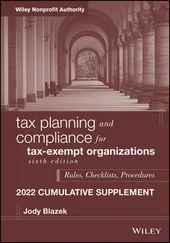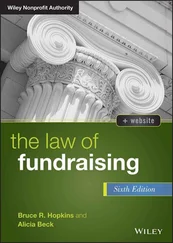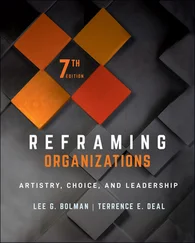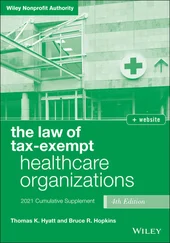Bruce R. Hopkins - The Law of Tax-Exempt Organizations, 2021 Cumulative Supplement
Здесь есть возможность читать онлайн «Bruce R. Hopkins - The Law of Tax-Exempt Organizations, 2021 Cumulative Supplement» — ознакомительный отрывок электронной книги совершенно бесплатно, а после прочтения отрывка купить полную версию. В некоторых случаях можно слушать аудио, скачать через торрент в формате fb2 и присутствует краткое содержание. Жанр: unrecognised, на английском языке. Описание произведения, (предисловие) а так же отзывы посетителей доступны на портале библиотеки ЛибКат.
- Название:The Law of Tax-Exempt Organizations, 2021 Cumulative Supplement
- Автор:
- Жанр:
- Год:неизвестен
- ISBN:нет данных
- Рейтинг книги:5 / 5. Голосов: 1
-
Избранное:Добавить в избранное
- Отзывы:
-
Ваша оценка:
- 100
- 1
- 2
- 3
- 4
- 5
The Law of Tax-Exempt Organizations, 2021 Cumulative Supplement: краткое содержание, описание и аннотация
Предлагаем к чтению аннотацию, описание, краткое содержание или предисловие (зависит от того, что написал сам автор книги «The Law of Tax-Exempt Organizations, 2021 Cumulative Supplement»). Если вы не нашли необходимую информацию о книге — напишите в комментариях, мы постараемся отыскать её.
The Law of Tax-Exempt Organizations, 2021 Cumulative Supplement — читать онлайн ознакомительный отрывок
Ниже представлен текст книги, разбитый по страницам. Система сохранения места последней прочитанной страницы, позволяет с удобством читать онлайн бесплатно книгу «The Law of Tax-Exempt Organizations, 2021 Cumulative Supplement», без необходимости каждый раз заново искать на чём Вы остановились. Поставьте закладку, и сможете в любой момент перейти на страницу, на которой закончили чтение.
Интервал:
Закладка:
Likewise, an organization was denied recognition of exemption as a social welfare organization because its activities consisted of provision of maintenance services to its members, which were businesses owning lots in a commercial shopping property, in exchange for assessments. 54.1
§ 13.3 CONDUCT OF BUSINESS
p. 336. Insert following carryover paragraph, before heading:
An organization was formed to operate a “holistic medicine establishment” selling medicinal marijuana products to patients with prescriptions from licensed physicians; it conducted a storefront business, being licensed by a state as a retailer of recreational‐use cannabis. The IRS denied recognition of exemption as a social welfare organization to this entity, on the ground that its primary activity was carrying on a business with the public in a manner similar to for‐profit organizations. 113.1 The IRS applied the commerciality doctrine in reaching this conclusion, finding that the organization “use[s] promotional policies to enhance sales,” “advertises goods and services,” sets margins at a level that “enables [it] to replace merchandise inventory,” and “maintain[s] a retail outlet with hours of operation that are competitive with other retail establishments.” 113.2 Notably, the IRS did not deploy the arguments that it uses in the charitable setting: namely, that the activity is illegal under federal law and is contrary to federal public policy. 113.3
Notes
1 11.1 E.g., Priv. Ltr. Rul. 202015036.
2 54.1 Priv. Ltr. Rul. 201907013.
3 113.1 Priv. Ltr. Rul. 201941028.
4 113.2 See § 4.9(g).
5 113.3 See §§ 6.2(a), 6.3(i).
CHAPTER FOURTEEN Business Leagues and Similar Organizations
§ 14.1 Concept of Business League (a) General Principles (g) Certification Programs
§ 14.2 Disqualifying Activities(a) Line‐of‐Business Requirement (c) Performance of Particular Services (d) Private Inurement (d‐1) Private Benefit
§ 14.1 CONCEPT OF BUSINESS LEAGUE
(a) General Principles
p. 338, note 7. Insert following existing text:
Occasionally, a tax‐exempt organization, such as a charitable entity, will have its operations evolve from activities originally established into those of an exempt business league (e.g., Priv. Ltr. Rul. 201907011).
(g) Certification Programs
p. 349, second complete paragraph. Insert as last sentence:
It is the view of the IRS, however, that certification programs are inconsistent with tax‐exempt status for charitable, educational, and scientific organizations, due to the extent of private benefit conferred on the certified individuals. 113
p. 349. Insert as third complete paragraph:
For example, the IRS revoked the tax‐exempt status of a public charity that evolved to the point that its primary functions were the certification of travel professionals; the agency rejected the argument that an eco‐certification program was charitable in nature. 113.1 Likewise, a public charity lost its exemption because, due to a merger, it undertook a substantial new program of certifying individuals in a health care field. 113.2
§ 14.2 DISQUALIFYING ACTIVITIES
(a) Line‐of‐Business Requirement
p. 351, carryover paragraph, ninth line. Delete and.
p. 351, carryover paragraph, last line. Delete period and insert semi‐colon; insert following existing text:
an organization providing a forum for the exchange of information to assist users and potential users of a software application; 133.1 and an organization that is an association of franchise owners. 133.2
p. 351, note 133. Delete text and insert:
E.g., Priv. Ltr. Rul. 201721020. This type of referral group cannot qualify as a tax‐exempt social welfare organization (see Chapter 13) (e.g., Priv. Ltr. Rul. 202009025).
(c) Performance of Particular Services
p. 356, carryover paragraph, line 17. Delete and.
p. 356, carryover paragraph, last line. Delete period and insert following existing text:
; an organization with the primary activity of negotiating with vendors to secure improved supply pricing for its members to enable them to compete with large national franchises; 191.1 an organization offering early‐stage companies investment opportunities for its members; 191.2 an organization operating a scheduling service for its member food truck operaters; 191.3 an organization formed to increase the efficiency and performance of its member networks; 191.4 and an association of bridal salons where its primary activity was advertising. 191
p. 357. Insert as second complete paragraph:
Application of the particular services rule by the IRS has recently been nicely illustrated in connection with the activities of associations of umpires and referees. Although these organizations provide education and training for their membership, their primary function is to schedule, assign, and pay their members for their officiating services. The IRS rejects these organization's efforts to be recognized as tax‐exempt business leagues on the ground that they are providing particular services to their members by arranging employment opportunities for them, resulting in impermissible private benefit. The IRS has so ruled in cases involving baseball umpires, 199.1 tennis umpires, 199.2 soccer referees, 199.3 and volleyball officials. 199.4
p. 359. Insert following second complete paragraph, before heading:
(d) Private Inurement
p. 359, note 216. Delete 200508016 and insert 200505024.
(d‐1) Private Benefit
The IRS occasionally invokes the private benefit doctrine 217.1 when denying recognition of tax exemption to an organization seeking to be an exempt business league. This doctrine is more likely to be applied than the private inurement doctrine because most of these organizations' memberships lack the status of insiders. 217.2 Use of the private benefit doctrine is often made in tandem with application of the particular services rule. 217.3
For example, an organization that pursued tax exemption as a business league was operated primarily to provide cooperative services for its members, acting as a bargaining agent to negotiate for better terms and conditions of doing business with vendors, suppliers, and service providers, with whom its members do business. In addition to invoking the particular services rule, the IRS held that this entity was providing economic benefit to its members. 217.4
Notes
1 113 See §§ 7.8, text accompanied by notes 321.1–321.5; 20.13(a).
2 113.1 Priv. Ltr. Rul. 201843016.
3 113.2 Priv. Ltr. Rul. 201906010.
4 133.1 Priv. Ltr. Rul. 202013016.
5 133.2 Priv. Ltr. Rul. 202017028.
6 191.1 Priv. Ltr. Rul. 201907007.
7 191.2 Priv. Ltr. Rul. 201944014.
8 191.3 Priv. Ltr. Rul. 202015022.
9 191.4 Priv. Ltr. Rul. 202015025.
10 191 Priv. Ltr. Rul. 202034010.
11 199.1 E.g., Priv. Ltr. Rul. 201511024.
12 199.2 Priv. Ltr. Rul. 201820020.
13 199.3 Priv. Ltr. Rul. 201924019.
14 199.4 Priv. Ltr. Rul. 201931010.
15 217.1 See § 20.13(a).
16 217.2 See § 20.3.
17 217.3 See § 14.2(c)(i), (ii).
18 217.4 Priv. Ltr. Rul. 201931013.
CHAPTER FIFTEEN Social Clubs
§ 15.1 Social Clubs in General(b) Club Functions
§ 15.4 Exceptions to Limitations
§ 15.5 Taxation of Social Clubs
Читать дальшеИнтервал:
Закладка:
Похожие книги на «The Law of Tax-Exempt Organizations, 2021 Cumulative Supplement»
Представляем Вашему вниманию похожие книги на «The Law of Tax-Exempt Organizations, 2021 Cumulative Supplement» списком для выбора. Мы отобрали схожую по названию и смыслу литературу в надежде предоставить читателям больше вариантов отыскать новые, интересные, ещё непрочитанные произведения.
Обсуждение, отзывы о книге «The Law of Tax-Exempt Organizations, 2021 Cumulative Supplement» и просто собственные мнения читателей. Оставьте ваши комментарии, напишите, что Вы думаете о произведении, его смысле или главных героях. Укажите что конкретно понравилось, а что нет, и почему Вы так считаете.
